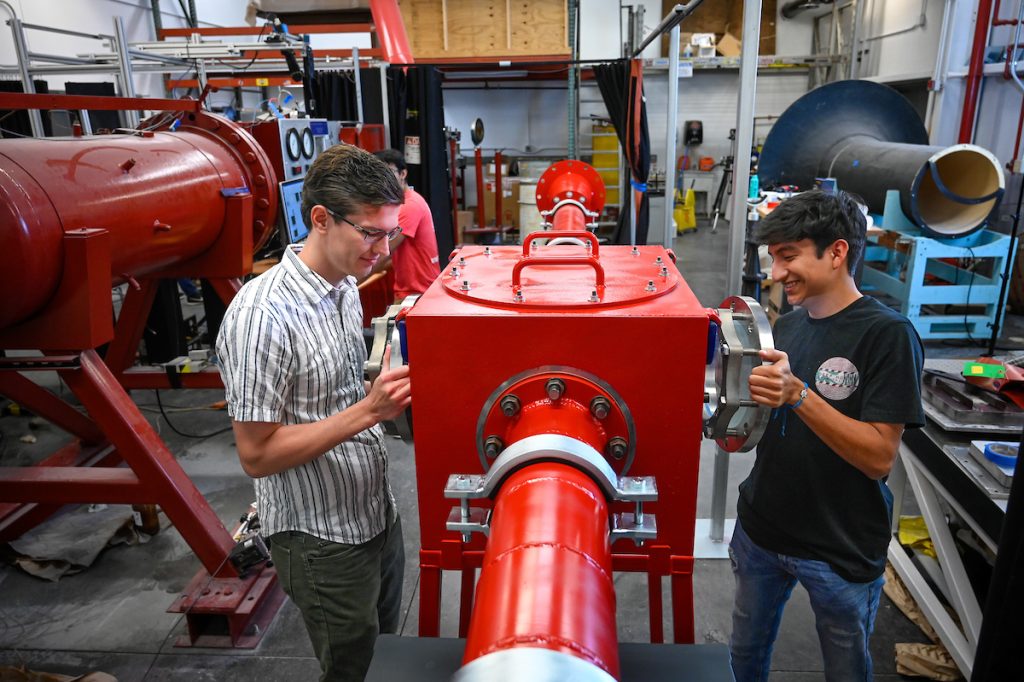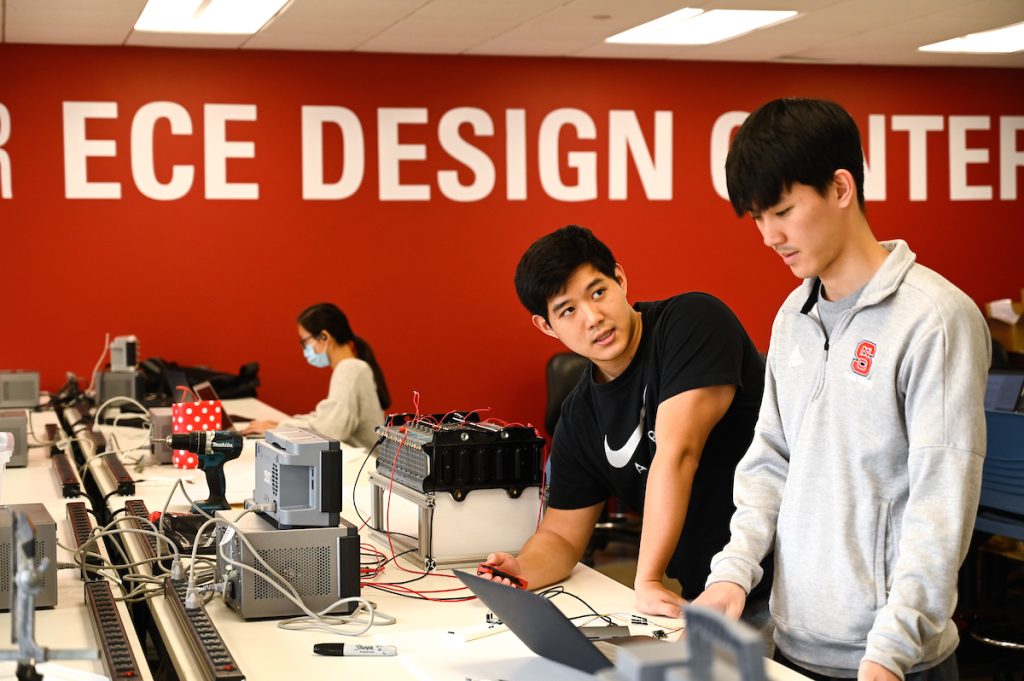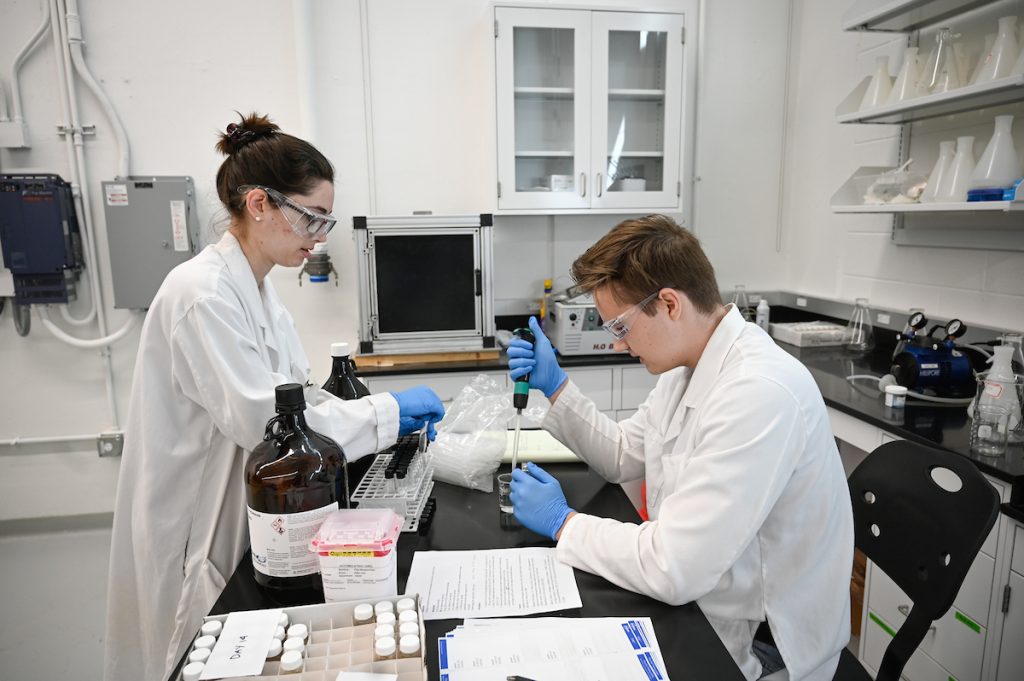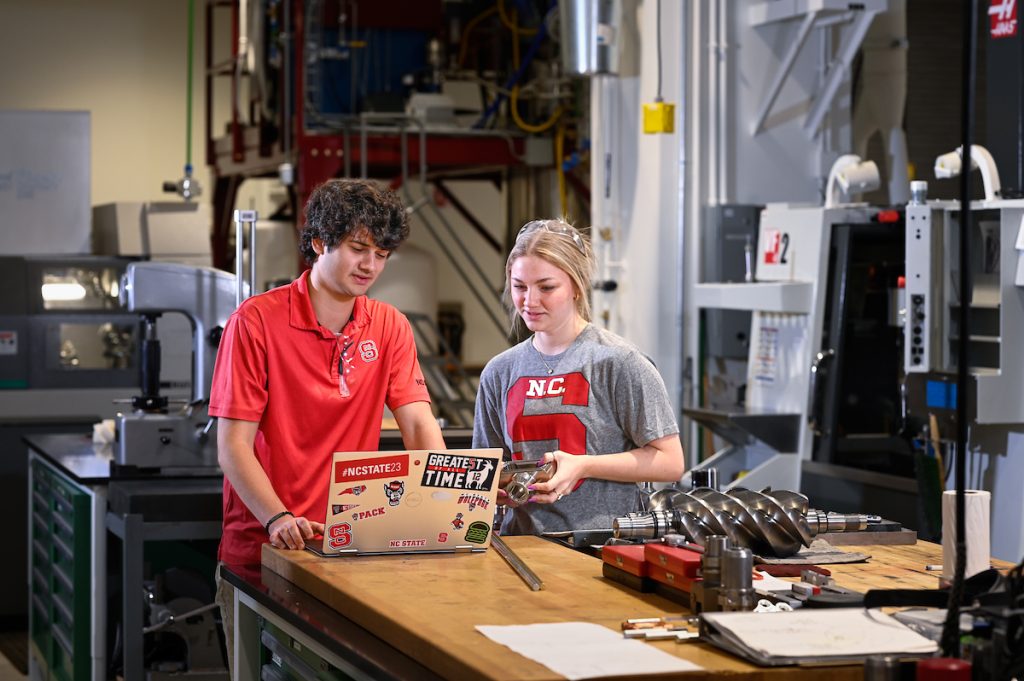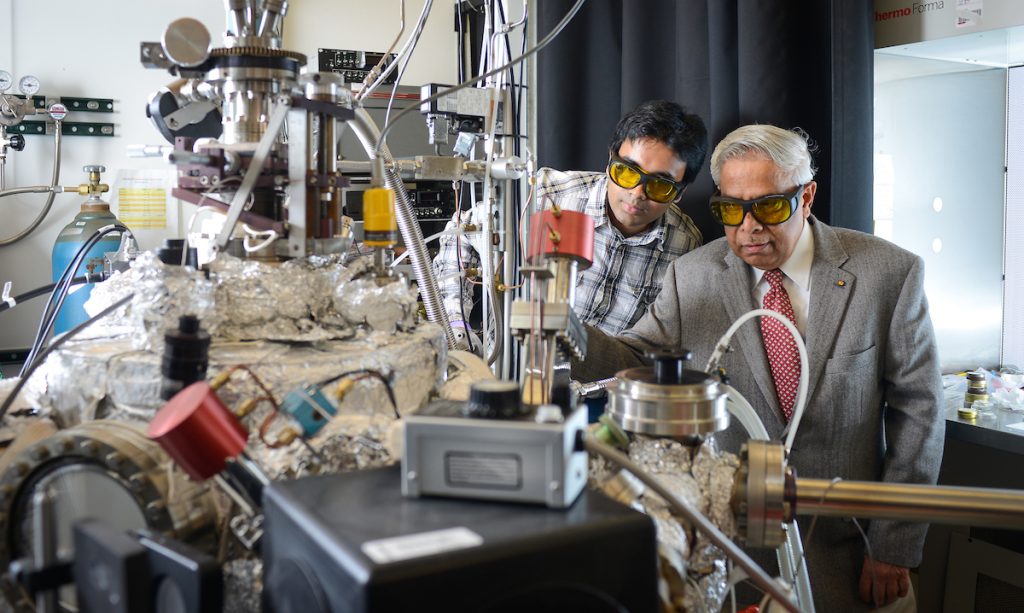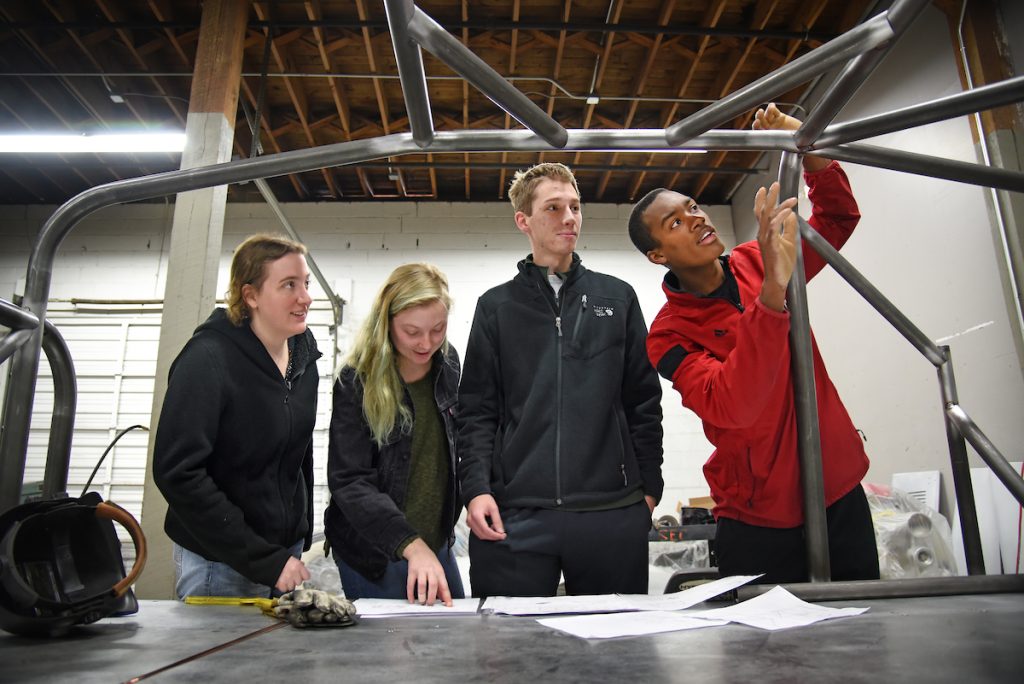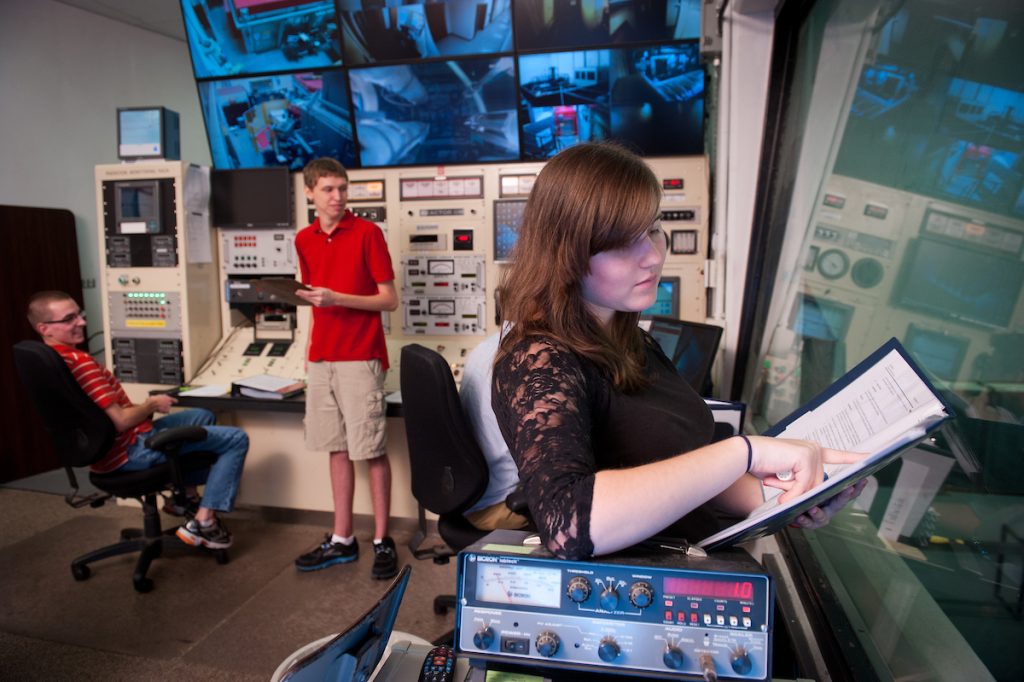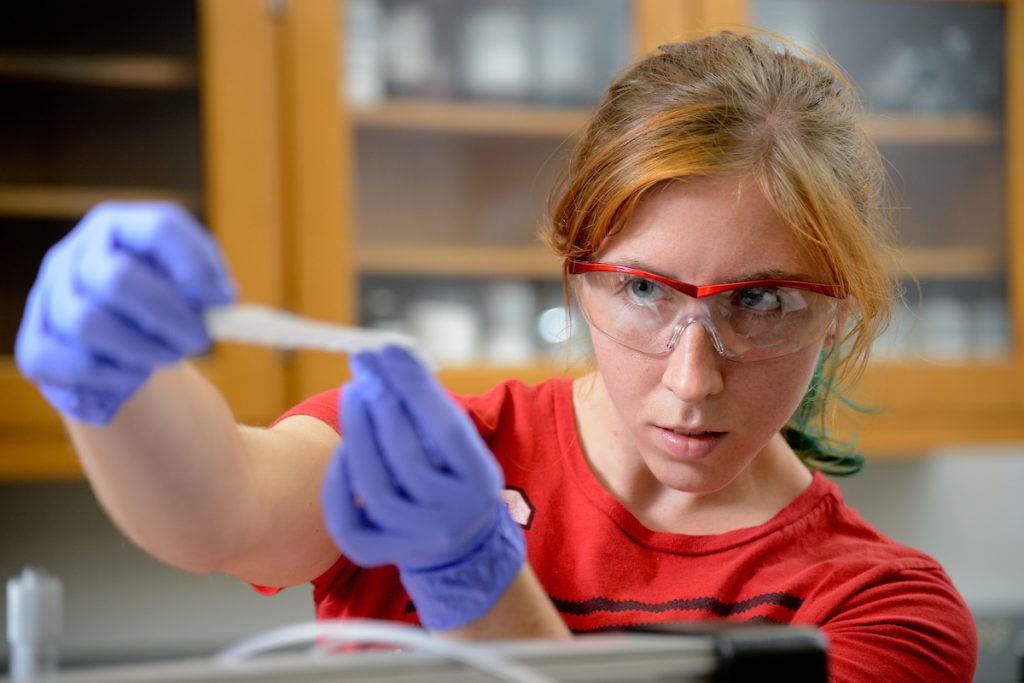ABET-Accredited Degree Programs
The ABET organization accredits post-secondary education programs in the disciplines of applied and natural science, computing engineering and engineering technology.
NC State University has 18 ABET-accredited degree programs. The links below provide information on each program’s accreditation status, program educational objectives, learning outcomes and enrollment and degrees awarded.

Degree Programs
Select one of the 18 ABET-accredited degree programs for more information:
- Aerospace Engineering
- Mechanical Engineering Systems Concentration
- Biological Engineering
- Biomedical and Health Sciences Engineering
- Chemical Engineering
- Civil Engineering
- Computer Engineering
- Computer Science
- Construction Engineering
- Electrical Engineering
- Environmental Engineering
- Industrial Engineering
- Materials Science and Engineering
- Mechanical Engineering
- Mechatronics Concentration
- Nuclear Engineering
- Paper Science and Engineering
- Textile Engineering
Aerospace Engineering
The NC State Aerospace Engineering program is accredited by the Engineering Accreditation Commission of ABET, https://www.abet.org.
Below you will find program educational objectives (PEOs), student learning outcomes and recent enrollment and graduation information.
PEOs
Within a few years after graduation, alumni of the Aerospace Engineering program will achieve the following:
- Contribute to solving the engineering challenges that face our society.
- Lead successful and productive careers in the engineering fields and/or pursue further study in engineering or other fields such as medicine, business and law.
Student Learning Outcomes
- an ability to identify, formulate, and solve complex engineering problems by applying principles of engineering, science, and mathematics
- an ability to apply engineering design to produce solutions that meet specified needs with consideration of public health, safety, and welfare, as well as global, cultural, social, environmental, and economic factors
- an ability to communicate effectively with a range of audiences
- an ability to recognize ethical and professional responsibilities in engineering situations and make informed judgments, which must consider the impact of engineering solutions in global, economic, environmental, and societal contexts
- an ability to function effectively on a team whose members together provide leadership, create a collaborative and inclusive environment, establish goals, plan tasks, and meet objectives
- an ability to develop and conduct appropriate experimentation, analyze and interpret data, and use engineering judgment to draw conclusions
- an ability to acquire and apply new knowledge as needed, using appropriate learning strategies.
Undergraduate Enrollment and Degrees Awarded
| Fall 2022 Undergraduate Enrollment | 484 |
| 2021-22 Undergraduate Degrees Awarded | 63 |
Engineering – Mechanical Engineering Systems Concentration
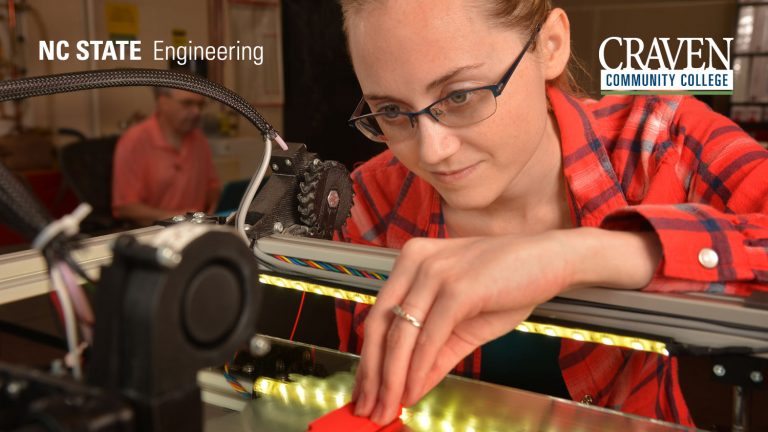
The NC State Bachelor of Science in Engineering (B.S.E.) with a concentration in Mechanical Engineering Systems program is accredited by the Engineering Accreditation Commission of ABET, https://www.abet.org.
Below you will find program educational objectives (PEOs), student learning outcomes and recent enrollment and graduation information.
PEOs
Graduates of the B.S.E. with a concentration in Mechanical Engineering Systems program will attain the following objectives within three to five of graduating:
- Be engaged in the professional practice of engineering or be enrolled in graduate school.
- Establish themselves as problem solvers in the workplace through the practical application of engineering and systems knowledge and skills.
- Function effectively in a professional environment by utilizing written and oral communication, teamwork, project management and leadership skills.
- Continuously improve and expand their technical and professional skills through formal study, as well as through informal means.
Student Learning Outcomes
- an ability to identify, formulate, and solve complex engineering problems by applying principles of engineering, science, and mathematics, including multivariate calculus and differential equations
- an ability to apply engineering design to produce solutions that meet specified needs with consideration of public health, safety, and welfare, as well as global, cultural, social, environmental, and economic factors
- an ability to communicate effectively with a range of audiences
- an ability to recognize ethical and professional responsibilities in engineering situations and make informed judgments, which must consider the impact of engineering solutions in global, economic, environmental, and societal contexts
- an ability to function effectively on a team whose members together provide leadership, create a collaborative and inclusive environment, establish goals, plan tasks, and meet objectives
- an ability to develop and conduct appropriate experimentation, analyze and interpret data, and use engineering judgment to draw conclusions
- an ability to acquire and apply new knowledge as needed, using appropriate learning strategies.
Undergraduate Enrollment and Degrees Awarded
| Fall 2022 Undergraduate Enrollment | 41 |
| 2021-22 Undergraduate Degrees Awarded | 17 |
Biological Engineering
The NC State Biological Engineering program is accredited by the Engineering Accreditation Commission of ABET, https://www.abet.org.
Below you will find program educational objectives (PEOs), student learning outcomes and recent enrollment and graduation information.
PEOs
Within the first five years following graduation, NC State’s Biological Engineering graduates will achieve the following:
- Excel in their careers by applying their engineering knowledge, critical-thinking skills, systematic approach to problem-solving, and innovation to improve biological and agricultural systems.
- Work effectively both independently and as part of professional teams and demonstrate leadership potential in project management.
- Display professionalism, ethics, equity, and inclusivity in the practice of engineering to improve and safeguard life, health, and public welfare.
- Communicate effectively in a professional environment.
- Be engaged in life-long learning and professional development.
Student Learning Outcomes
- an ability to identify, formulate, and solve complex engineering problems by applying principles of engineering, science, and mathematics
- an ability to apply engineering design to produce solutions that meet specified needs with consideration of public health, safety, and welfare, as well as global, cultural, social, environmental, and economic factors
- an ability to communicate effectively with a range of audiences
- an ability to recognize ethical and professional responsibilities in engineering situations and make informed judgments, which must consider the impact of engineering solutions in global, economic, environmental, and societal contexts
- an ability to function effectively on a team whose members together provide leadership, create a collaborative and inclusive environment, establish goals, plan tasks, and meet objectives
- an ability to develop and conduct appropriate experimentation, analyze and interpret data, and use engineering judgment to draw conclusions
- an ability to acquire and apply new knowledge as needed, using appropriate learning strategies.
Undergraduate Enrollment and Degrees Awarded
| Fall 2022 Undergraduate Enrollment | 112 |
| 2021-22 Undergraduate Degrees Awarded | 36 |
Biomedical and Health Sciences Engineering
The UNC/NC State Joint Biomedical and Health Sciences Engineering program is accredited by the Engineering Accreditation Commission of ABET, https://www.abet.org.
Below you will find program educational objectives (PEOs), student learning outcomes and recent enrollment and graduation information.
PEOs
The educational objectives of the UNC/NC State Joint Biomedical and Health Sciences Engineering program are to prepare its graduates to do the following:
- Acquire additional skills and knowledge in biomedical engineering or other disciplines;
- Meet or exceed the expectations of their employers in the biomedical engineering workplace or other professional careers;
- Adapt to evolving technology and changing career opportunities.
Student Learning Outcomes
- an ability to identify, formulate, and solve complex engineering problems by applying principles of engineering, science, and mathematics.
- an ability to apply engineering design to produce solutions that meet specified needs with consideration of public health, safety, and welfare, as well as global, cultural, social, environmental, and economic factors
- an ability to communicate effectively with a range of audiences
- an ability to recognize ethical and professional responsibilities in engineering situations and make informed judgments, which must consider the impact of engineering solutions in global, economic, environmental, and societal contexts
- an ability to function effectively on a team whose members together provide leadership, create a collaborative and inclusive environment, establish goals, plan tasks, and meet objectives
- an ability to develop and conduct appropriate experimentation, analyze and interpret data, and use engineering judgment to draw conclusions
- an ability to acquire and apply new knowledge as needed, using appropriate learning strategies.
Undergraduate Enrollment and Degrees Awarded
| Fall 2022 Undergraduate Enrollment | 926 |
| 2021-22 Undergraduate Degrees Awarded | 132 |
Chemical Engineering
The NC State Chemical Engineering program is accredited by the Engineering Accreditation Commission of ABET, https://www.abet.org.
Below you will find program educational objectives (PEOs), student learning outcomes and recent enrollment and graduation information.
PEOs
The Chemical Engineering program is preparing its graduates to do the following:
- Excel and advance professionally in engineering practices and/or entrepreneurship in a field of their choosing, including advanced materials, agricultural, automation, biomanufacturing, biotechnology, chemical, consumer products, energy, environmental, petrochemical, pharmaceutical, pulp and paper, and semiconductors.
- Excel in an advanced degree program enabling a career in academia, law, medicine, business, or research and development.
- Exhibit an appreciation of the impact of engineering development in society, particularly in the context of environmental protection, sustainability, safety, and financial accountability.
- Exhibit professionalism, lifelong learning, ethical responsibility, and a commitment to diversity, equity, and inclusion.
Student Learning Outcomes
By graduation, our students are able to
- an ability to identify, formulate, and solve complex engineering problems by applying principles of engineering, science, and mathematics
- an ability to apply engineering design to produce solutions that meet specified needs with consideration of public health, safety, and welfare, as well as global, cultural, social, environmental, and economic factors
- an ability to communicate effectively with a range of audiences
- an ability to recognize ethical and professional responsibilities in engineering situations and make informed judgments, which must consider the impact of engineering solutions in global, economic, environmental, and societal contexts
- an ability to function effectively on a team whose members together provide leadership, create a collaborative and inclusive environment, establish goals, plan tasks, and meet objectives
- an ability to develop and conduct appropriate experimentation, analyze and interpret data, and use engineering judgment to draw conclusions
- an ability to acquire and apply new knowledge as needed, using appropriate learning strategies.
Undergraduate Enrollment and Degrees Awarded
| Fall 2022 Undergraduate Enrollment | 483 |
| 2021-22 Undergraduate Degrees Awarded | 160 |
Civil Engineering
The NC State Civil Engineering program is accredited by the Engineering Accreditation Commission of ABET, https://www.abet.org.
Below you will find program educational objectives (PEOs), student learning outcomes and recent enrollment and graduation information.
PEOs
Within a few years of graduation, alumni of the Civil Engineering Program will do the following:
- Function successfully in a professional environment by utilizing and enhancing their leadership, technical, critical thinking, and communication skills.
- Develop lifelong learning skills through graduate or other professional education and obtaining licensure where appropriate.
- Function in team-oriented, multidisciplinary open-ended engineering activities considering the societal, economic, public health, and environmental impacts of engineering decisions, and the professional and ethical responsibilities of civil engineers.
- Promote organizational success with consideration of cost and time management while practicing and promoting ethical behavior and stewardship of a sustainable environment.
Student Learning Outcomes
- an ability to identify, formulate, and solve complex engineering problems by applying principles of engineering, science, and mathematics
- an ability to apply engineering design to produce solutions that meet specified needs with consideration of public health, safety, and welfare, as well as global, cultural, social, environmental, and economic factors
- an ability to communicate effectively with a range of audiences
- an ability to recognize ethical and professional responsibilities in engineering situations and make informed judgments, which must consider the impact of engineering solutions in global, economic, environmental, and societal contexts
- an ability to function effectively on a team whose members together provide leadership, create a collaborative and inclusive environment, establish goals, plan tasks, and meet objectives
- an ability to develop and conduct appropriate experimentation, analyze and interpret data, and use engineering judgment to draw conclusions
- an ability to acquire and apply new knowledge as needed, using appropriate learning strategies.
Undergraduate Enrollment and Degrees Awarded
| Fall 2022 Undergraduate Enrollment | 569 |
| 2021-22 Undergraduate Degrees Awarded | 105 |
Computer Engineering
The NC State Computer Engineering program is accredited by the Engineering Accreditation Commission of ABET, https://www.abet.org.
Below you will find program educational objectives (PEOs), student learning outcomes and recent enrollment and graduation information.
PEOs
The graduates of the Computer Engineering (CPE) undergraduate program will attain the following within a few years after graduation:
- Productive and successful practice of their computer engineering background in a diverse range of careers.
- Continuous improvement of their knowledge and skills through formal and informal means and flexibility in adapting to the changes in economic and technological environments.
Student Learning Outcomes
- an ability to identify, formulate, and solve complex engineering problems by applying principles of engineering, science, and mathematics
- an ability to apply engineering design to produce solutions that meet specified needs with consideration of public health, safety, and welfare, as well as global, cultural, social, environmental, and economic factors
- an ability to communicate effectively with a range of audiences
- an ability to recognize ethical and professional responsibilities in engineering situations and make informed judgments, which must consider the impact of engineering solutions in global, economic, environmental, and societal contexts
- an ability to function effectively on a team whose members together provide leadership, create a collaborative and inclusive environment, establish goals, plan tasks, and meet objectives
- an ability to develop and conduct appropriate experimentation, analyze and interpret data, and use engineering judgment to draw conclusions
- an ability to acquire and apply new knowledge as needed, using appropriate learning strategies.
Undergraduate Enrollment and Degrees Awarded
| Fall 2022 Undergraduate Enrollment | 513 |
| 2021-22 Undergraduate Degrees Awarded | 136 |
Computer Science
The NC State Computer Science program is accredited by the Computing Accreditation Commission of ABET, https://www.abet.org.
Below you will find program educational objectives (PEOs), student learning outcomes and recent enrollment and graduation information.
PEOs
Within a few years after graduation, alumni of the CSC program will do the following:
- Apply technical and professional skills to successfully solve computing problems encountered in pursuit of advanced degrees and careers.
- Communicate well orally and in writing, interact professionally, demonstrate technical expertise and leadership, and work effectively on multidisciplinary, diverse, and global teams to achieve project objectives.
- Uphold high ethical standards and integrity, including concern for the safety, dignity, security, and privacy of individuals, organizations, and society.
- Promote quality, sustainability, inclusivity, and impact when engaging with computing challenges.
- Engage in lifelong learning by embracing change, exploring tradeoffs between alternative solutions, and innovating.
Student Learning Outcomes
As a program accredited by the ABET Computing Accreditation Commissions (CAC), graduates of the program will have an ability to:
- Analyze a complex computing problem and apply principles of computing and other relevant disciplines to identify solutions.
- Design, implement, and evaluate a computing-based solution to meet a given set of computing requirements in the context of computer science.
- Communicate effectively in a variety of professional contexts.
- Recognize professional responsibilities and make informed judgments in a computing practice based on legal and ethical principles.
- Function effectively as a member or leader of a team engaged in activities appropriate to computer science.
- Apply computer science theory and software development fundamentals to produce computing-based solutions.
The Department of Computer Science at NC State additionally states that upon graduation, CSC students will:
- apply theoretical and mathematical computing foundations and be able to:
- apply fundamental concepts of discrete mathematics, such as logic, proofs, set theory, relations, functions, and combinatorics, to model computational problems
- analyze and evaluate the complexity of algorithms and data structures for selecting the most appropriate solution for a computing problem
- use data structures, such as lists, stacks, queues, arrays, graphs, trees, heaps, and hashing, to design and create algorithms
- demonstrate and apply the theory of computation related to automata, computability, and computational complexity to solve computing problems
- demonstrate proficiency in one programming language and competence in at least one other programming language and be able to:
- write procedural programs
- write object-oriented programs,
- write parallel programs
- describe the hardware and software architecture of computer systems and be able to:
- explain the function and interaction of computer processing units, memories, and input/output devices
- define and explain elements of operating systems, such as memory management, process scheduling, synchronization and interaction, and input/output devices
- distinguish computer network elements and explain distributed computing
- identify and explain security and privacy of computers, software, and networks
- participate in professional practices related to software engineering and be able to:
- negotiate, clarify, and document customer requirements
- apply knowledge of fundamental algorithms, programming language concepts, and design patterns to determine an overall design for a software system
- implement a fully specified system
- test a fully specified system
- plan and monitor the progress of software projects to ensure on-time delivery of a high-quality system
- communicate effectively on computing topics and be able to:
- deliver an audience-sensitive oral technical presentation
- write an audience-sensitive technical document
- contribute as an effective member on a team
- demonstrate responsible professional practice and be able to:
- explain the ethical challenges unique to computing
- recognize and, when appropriate, resolve ethical challenges or dilemmas related to the computing profession
Undergraduate Enrollment and Degrees Awarded
| Fall 2022 Undergraduate Enrollment | 1638 |
| 2021-22 Undergraduate Degrees Awarded | 277 |
Construction Engineering
The NC State Construction Engineering program is accredited by the Engineering Accreditation Commission of ABET, https://www.abet.org.
Below you will find program educational objectives (PEOs), student learning outcomes and recent enrollment and graduation information.
PEOs
Within a few years of graduation, alumni of the Construction Engineering Program will do the following:
- Function successfully in careers emphasizing the application of construction engineering and management principles with the ability to solve a broad set of engineering problems in construction.
- Practice construction engineering including the design and management of the construction process to achieve needed safety, quality, durability, sustainability, schedule, and economic objectives for various stakeholders.
- Function in team-oriented, multi-disciplinary, open-ended engineering activities considering the societal and economic impacts of construction, and the professional and ethical responsibilities of the construction engineer.
- Engage in life-long learning through graduate study, self-study, or continuing education; pursue licensure; provide mentoring to those under their supervision and influence; and provide leadership in their employment organizations, industry associations, and professional societies.
Student Learning Outcomes
- an ability to identify, formulate, and solve complex engineering problems by applying principles of engineering, science, and mathematics
- an ability to apply engineering design to produce solutions that meet specified needs with consideration of public health, safety, and welfare, as well as global, cultural, social, environmental, and economic factors
- an ability to communicate effectively with a range of audiences
- an ability to recognize ethical and professional responsibilities in engineering situations and make informed judgments, which must consider the impact of engineering solutions in global, economic, environmental, and societal contexts
- an ability to function effectively on a team whose members together provide leadership, create a collaborative and inclusive environment, establish goals, plan tasks, and meet objectives
- an ability to develop and conduct appropriate experimentation, analyze and interpret data, and use engineering judgment to draw conclusions
- an ability to acquire and apply new knowledge as needed, using appropriate learning strategies.
Undergraduate Enrollment and Degrees Awarded
| Fall 2022 Undergraduate Enrollment | 70 |
| 2021-22 Undergraduate Degrees Awarded | 13 |
Electrical Engineering
The NC State Electrical Engineering program is accredited by the Engineering Accreditation Commission of ABET, https://www.abet.org.
Below you will find program educational objectives (PEOs), student learning outcomes and recent enrollment and graduation information.
PEOs
The graduates of the Electrical Engineering (EE) program are expected to attain the following within a few years after graduation:
- Productive and successful practice of their electrical engineering background in a diverse range of careers.
- Continuous improvement of their knowledge and skills through formal and informal means and flexibility in adapting to the changes in economic and technological environments.
Student Learning Outcomes
- an ability to identify, formulate, and solve complex engineering problems by applying principles of engineering, science, and mathematics
- an ability to apply engineering design to produce solutions that meet specified needs with consideration of public health, safety, and welfare, as well as global, cultural, social, environmental, and economic factors
- an ability to communicate effectively with a range of audiences
- an ability to recognize ethical and professional responsibilities in engineering situations and make informed judgments, which must consider the impact of engineering solutions in global, economic, environmental, and societal contexts
- an ability to function effectively on a team whose members together provide leadership, create a collaborative and inclusive environment, establish goals, plan tasks, and meet objectives
- an ability to develop and conduct appropriate experimentation, analyze and interpret data, and use engineering judgment to draw conclusions
- an ability to acquire and apply new knowledge as needed, using appropriate learning strategies.
Undergraduate Enrollment and Degrees Awarded
| Fall 2022 Undergraduate Enrollment | 564 |
| 2021-22 Undergraduate Degrees Awarded | 186 |
Environmental Engineering
The NC State Environmental Engineering program is accredited by the Engineering Accreditation Commission of ABET, https://www.abet.org.
Below you will find program educational objectives (PEOs), student learning outcomes and recent enrollment and graduation information.
PEOs
Within a few years of graduation, alumni of the Environmental Engineering program will do the following:
- Function successfully in a professional environment by utilizing and enhancing their leadership, technical, critical thinking, and communication skills.
- Continue learning through graduate or other professional education and obtaining licensure where appropriate.
- Function in team-oriented, multidisciplinary open-ended engineering activities considering the societal, and economic, public health, and environmental impacts of engineering decisions, and the professional and ethical responsibilities of environmental engineers.
- Engage in life-long learning through graduate study, self-study, or continuing education; pursue licensure; provide mentoring to those under their supervision and influence; and provide leadership in their employment organizations, industry associations, and professional societies.
Student Learning Outcomes
- an ability to identify, formulate, and solve complex engineering problems by applying principles of engineering, science, and mathematics
- an ability to apply engineering design to produce solutions that meet specified needs with consideration of public health, safety, and welfare, as well as global, cultural, social, environmental, and economic factors
- an ability to communicate effectively with a range of audiences
- an ability to recognize ethical and professional responsibilities in engineering situations and make informed judgments, which must consider the impact of engineering solutions in global, economic, environmental, and societal contexts
- an ability to function effectively on a team whose members together provide leadership, create a collaborative and inclusive environment, establish goals, plan tasks, and meet objectives
- an ability to develop and conduct appropriate experimentation, analyze and interpret data, and use engineering judgment to draw conclusions
- an ability to acquire and apply new knowledge as needed, using appropriate learning strategies.
Undergraduate Enrollment and Degrees Awarded
| Fall 2022 Undergraduate Enrollment | 173 |
| 2021-22 Undergraduate Degrees Awarded | 34 |
Industrial Engineering
The NC State Industrial Engineering program is accredited by the Engineering Accreditation Commission of ABET, https://www.abet.org.
Below you will find program educational objectives (PEOs), student learning outcomes and recent enrollment and graduation information.
PEOs
Alumni of the Industrial and Systems Engineering program will achieve careers of technical excellence and demonstrate professional leadership in the workplace and society through the following:
- Applying the discipline’s body of knowledge to the design and management of systems, products and processes by optimizing performance with multiple constraints and conflicting objectives while evaluatingthe importance of time, cost, and quality.
- Leading and collaborating on teams in the workplace, while assessing the economic, societal, and ethical impacts and communicating effectively with all stakeholders
- Adapting to changes in technology and our global society through continuous learning.
Student Learning Outcomes
- an ability to identify, formulate, and solve complex engineering problems by applying principles of engineering, science, and mathematics
- an ability to apply engineering design to produce solutions that meet specified needs with consideration of public health, safety, and welfare, as well as global, cultural, social, environmental, and economic factors
- an ability to communicate effectively with a range of audiences
- an ability to recognize ethical and professional responsibilities in engineering situations and make informed judgments, which must consider the impact of engineering solutions in global, economic, environmental, and societal contexts
- an ability to function effectively on a team whose members together provide leadership, create a collaborative and inclusive environment, establish goals, plan tasks, and meet objectives
- an ability to develop and conduct appropriate experimentation, analyze and interpret data, and use engineering judgment to draw conclusions
- an ability to acquire and apply new knowledge as needed, using appropriate learning strategies.
Undergraduate Enrollment and Degrees Awarded
| Fall 2022 Undergraduate Enrollment | 354 |
| 2021-22 Undergraduate Degrees Awarded | 101 |
Materials Science and Engineering
The NC State Materials Science and Engineering (MSE) program is accredited by the Engineering Accreditation Commission of ABET, https://www.abet.org.
Below you will find program educational objectives (PEOs), student learning outcomes and recent enrollment and graduation information.
PEOs
With the background knowledge in science, engineering, critical thinking and teamwork provided by the MSE curriculum, our alumni are expected to achieve one or more of the following within five years of graduation:
- Practice materials engineering in appropriate academic, industrial, government or entrepreneurial organizations.
- Earn an advanced degree, such as M.S., Ph.D. or M.B.A., leading to a career in academia, research and development or technical management.
- Be promoted into leadership roles in their chosen career.
- Demonstrate by their participation in technical societies, community service and professional activities a high degree of service and ethical responsibility to their professional field and the community.
Student Learning Outcomes
- an ability to identify, formulate, and solve complex engineering problems by applying principles of engineering, science, and mathematics
- an ability to apply engineering design to produce solutions that meet specified needs with consideration of public health, safety, and welfare, as well as global, cultural, social, environmental, and economic factors
- an ability to communicate effectively with a range of audiences
- an ability to recognize ethical and professional responsibilities in engineering situations and make informed judgments, which must consider the impact of engineering solutions in global, economic, environmental, and societal contexts
- an ability to function effectively on a team whose members together provide leadership, create a collaborative and inclusive environment, establish goals, plan tasks, and meet objectives
- an ability to develop and conduct appropriate experimentation, analyze and interpret data, and use engineering judgment to draw conclusions
- an ability to acquire and apply new knowledge as needed, using appropriate learning strategies.
Undergraduate Enrollment and Degrees Awarded
| Fall 2022 Undergraduate Enrollment | 124 |
| 2021-22 Undergraduate Degrees Awarded | 43 |
Mechanical Engineering
The NC State Mechanical Engineering program is accredited by the Engineering Accreditation Commission of ABET, https://www.abet.org.
Below you will find program educational objectives (PEOs), student learning outcomes and recent enrollment and graduation information.
PEOs
Within a few years after graduation, alumni of the Mechanical Engineering program will do the following:
- Contribute to solving the engineering challenges that face our society.
- Lead successful and productive careers in the engineering fields and/or pursue further study in engineering or other fields such as medicine, business and law.
Student Learning Outcomes
- an ability to identify, formulate, and solve complex engineering problems by applying principles of engineering, science, and mathematics
- an ability to apply engineering design to produce solutions that meet specified needs with consideration of public health, safety, and welfare, as well as global, cultural, social, environmental, and economic factors
- an ability to communicate effectively with a range of audiences
- an ability to recognize ethical and professional responsibilities in engineering situations and make informed judgments, which must consider the impact of engineering solutions in global, economic, environmental, and societal contexts
- an ability to function effectively on a team whose members together provide leadership, create a collaborative and inclusive environment, establish goals, plan tasks, and meet objectives
- an ability to develop and conduct appropriate experimentation, analyze and interpret data, and use engineering judgment to draw conclusions
- an ability to acquire and apply new knowledge as needed, using appropriate learning strategies.
Undergraduate Enrollment and Degrees Awarded
| Fall 2022 Undergraduate Enrollment | 1121 |
| 2021-22 Undergraduate Degrees Awarded | 248 |
Engineering – Mechatronics Concentration Joint
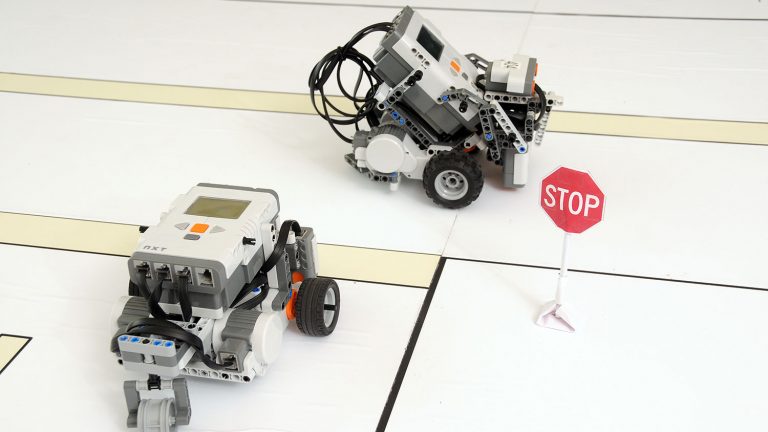
The Joint NCSU/UNCA B.S. in Engineering, Mechatronics Concentration (JEM) program is accredited by the Engineering Accreditation Commission of ABET, https://www.abet.org.
Below you will find program educational objectives (PEOs), student learning outcomes and recent enrollment and graduation information.
PEOs
Within a few years of graduation, successful alumni of the Joint NCSU/UNCA B.S. in Engineering, Mechatronics Concentration (JEM) degree should:
- Attain productive professional careers in mechatronics engineering or related fields.
- Be committed to upholding and advancing the integrity of the engineering profession.
- Make decisions with accountability for the social and environmental impact of their engineering practices.
- Interact effectively with a diversity of individuals while viewing their own work in the broader context of our global society.
- Attain technical excellence by engaging in life-long learning.
Student Learning Outcomes
- an ability to identify, formulate, and solve complex engineering problems by applying principles of engineering, science, and mathematics
- an ability to apply engineering design to produce solutions that meet specified needs with consideration of public health, safety, and welfare, as well as global, cultural, social, environmental, and economic factors
- an ability to communicate effectively with a range of audiences
- an ability to recognize ethical and professional responsibilities in engineering situations and make informed judgments, which must consider the impact of engineering solutions in global, economic, environmental, and societal contexts
- an ability to function effectively on a team whose members together provide leadership, create a collaborative and inclusive environment, establish goals, plan tasks, and meet objectives
- an ability to develop and conduct appropriate experimentation, analyze and interpret data, and use engineering judgment to draw conclusions
- an ability to acquire and apply new knowledge as needed, using appropriate learning strategies.
Undergraduate Enrollment and Degrees Awarded
| Fall 2022 Undergraduate Enrollment | 166 |
| 2021-22 Undergraduate Degrees Awarded | 23 |
Nuclear Engineering
The NC State Nuclear Engineering program is accredited by the Engineering Accreditation Commission of ABET, https://www.abet.org.
Below you will find program educational objectives (PEOs), student learning outcomes and recent enrollment and graduation information.
PEOs
Within a few years after graduation, alumni of the Nuclear Engineering program will attain the following:
- A track record of solving technical challenges facing the field of nuclear engineering through the detailed process of engineering design and the advance of nuclear engineering practice and research.
- A reputation of adhering to the highest professional and ethical standards in the field, holding both the societal and environmental impact of their field’s practices in the highest regard.
- Written and oral communication skills that are highly effective in a diverse, cross-disciplinary, and global community of colleagues and stakeholders.
- The professional responsibility of continued self-improvement and education through professional licensing, graduate and professional education, and continued lifelong learning.
Student Learning Outcomes
- an ability to identify, formulate, and solve complex engineering problems by applying principles of engineering, science, and mathematics
- an ability to apply engineering design to produce solutions that meet specified needs with consideration of public health, safety, and welfare, as well as global, cultural, social, environmental, and economic factors
- an ability to communicate effectively with a range of audiences
- an ability to recognize ethical and professional responsibilities in engineering situations and make informed judgments, which must consider the impact of engineering solutions in global, economic, environmental, and societal contexts
- an ability to function effectively on a team whose members together provide leadership, create a collaborative and inclusive environment, establish goals, plan tasks, and meet objectives
- an ability to develop and conduct appropriate experimentation, analyze and interpret data, and use engineering judgment to draw conclusions
- an ability to acquire and apply new knowledge as needed, using appropriate learning strategies.
Undergraduate Enrollment and Degrees Awarded
| Fall 2022 Undergraduate Enrollment | 124 |
| 2021-22 Undergraduate Degrees Awarded | 16 |
Paper Science and Engineering
The NC State Paper Science and Engineering program is accredited by the Engineering Accreditation Commission of ABET, https://www.abet.org.
Below you will find program educational objectives (PEOs), student learning outcomes and recent enrollment and graduation information.
PEOs
Within a few years after graduation, alumni of the Paper Science and Engineering program at NC State University will be the following:
- Effective engineers and leaders in the paper, chemical process and related industries.
- Professionals who act in a safe and ethical manner.
- Learners who acquire, analyze, and apply new knowledge effectively.
Student Learning Outcomes
- an ability to identify, formulate, and solve complex engineering problems by applying principles of engineering, science, and mathematics
- an ability to apply engineering design to produce solutions that meet specified needs with consideration of public health, safety, and welfare, as well as global, cultural, social, environmental, and economic factors
- an ability to communicate effectively with a range of audiences
- an ability to recognize ethical and professional responsibilities in engineering situations and make informed judgments, which must consider the impact of engineering solutions in global, economic, environmental, and societal contexts
- an ability to function effectively on a team whose members together provide leadership, create a collaborative and inclusive environment, establish goals, plan tasks, and meet objectives
- an ability to develop and conduct appropriate experimentation, analyze and interpret data, and use engineering judgment to draw conclusions
- an ability to acquire and apply new knowledge as needed, using appropriate learning strategies.
Undergraduate Enrollment and Degrees Awarded
| Fall 2022 Undergraduate Enrollment | 160 |
| 2021-22 Undergraduate Degrees Awarded | 45 |
Textile Engineering
The NC State Textile Engineering program is accredited by the Engineering Accreditation Commission of ABET, https://www.abet.org.
Below you will find program educational objectives (PEOs), student learning outcomes and recent enrollment and graduation information.
PEOs
Within a few years after graduation, alumni from the Textile Engineering program will have attained the following:
- Recognized contributions in the workplace that involve creative and critical thinking in applying the discipline’s body of knowledge and for tackling contemporary issues and engineering challenges that face our global society.
- Recognition as effective problem solvers with a commitment to professionalism, ethical conduct and safety.
- Established communication and teaming skills in a professional environment.
- Evidence of continuous learning through seeking educational and developmental opportunities and by adapting to ever-changing economic, social and technological environments.
Student Learning Outcomes
- an ability to identify, formulate, and solve complex engineering problems by applying principles of engineering, science, and mathematics
- an ability to apply engineering design to produce solutions that meet specified needs with consideration of public health, safety, and welfare, as well as global, cultural, social, environmental, and economic factors
- an ability to communicate effectively with a range of audiences
- an ability to recognize ethical and professional responsibilities in engineering situations and make informed judgments, which must consider the impact of engineering solutions in global, economic, environmental, and societal contexts
- an ability to function effectively on a team whose members together provide leadership, create a collaborative and inclusive environment, establish goals, plan tasks, and meet objectives
- an ability to develop and conduct appropriate experimentation, analyze and interpret data, and use engineering judgment to draw conclusions
- an ability to acquire and apply new knowledge as needed, using appropriate learning strategies.
Undergraduate Enrollment and Degrees Awarded
| Fall 2022 Undergraduate Enrollment | 77 |
| 2021-22 Undergraduate Degrees Awarded | 22 |
